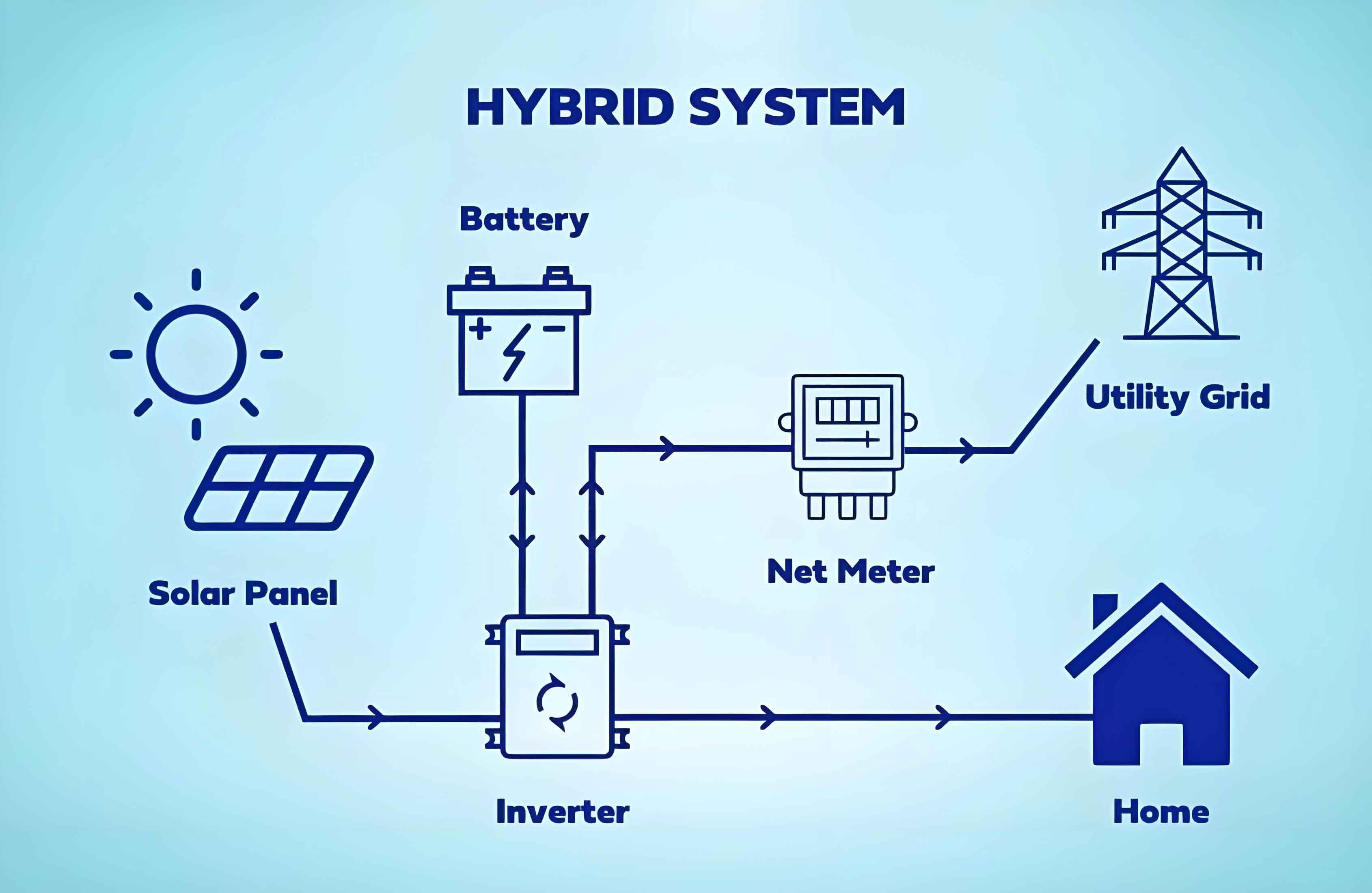
Introduction
Hybrid solar battery system represent the next evolution in renewable energy technology, combining solar power with advanced battery storage to create highly efficient and reliable energy solutions. These systems not only provide sustainable energy but also enhance grid stability, increase energy independence, and offer significant cost savings. This article explores the future of hybrid solar battery system, discussing their components, benefits, technological advancements, and future trends.
What is a Hybrid Solar Battery System?
A hybrid solar battery system integrates solar energy generation with battery storage and often includes an auxiliary power source such as the grid or a generator. This combination ensures a continuous and reliable power supply, even when solar energy is not available.
Table 1: Key Components of Hybrid Solar Battery System
| Component | Function |
|---|---|
| Solar Panels | Convert sunlight into direct current (DC) electricity |
| Charge Controller | Regulates the voltage and current from the solar panels to the batteries |
| Batteries | Store energy for use during periods without sunlight |
| Inverter | Converts DC electricity from the batteries to alternating current (AC) for household use |
| Auxiliary Power Source | Provides backup power, typically from the grid or a generator |
| System Monitoring | Tracks performance and ensures optimal operation |
Benefits of Hybrid Solar Battery System
Hybrid solar battery system offer numerous advantages that make them an attractive option for both residential and commercial applications.
- Energy Independence:
- Provides a reliable power source without relying solely on the grid.
- Cost Savings:
- Reduces electricity bills by utilizing stored solar energy during peak demand periods.
- Grid Stability:
- Supports the grid by providing ancillary services such as frequency regulation and peak shaving.
- Environmental Sustainability:
- Reduces carbon footprint by utilizing renewable solar energy and decreasing reliance on fossil fuels.
- Backup Power:
- Ensures continuous power supply during grid outages, enhancing energy security.
Technological Advancements in Hybrid Solar Battery System
Advancements in technology are driving the evolution of hybrid solar battery system, making them more efficient, affordable, and accessible.
1. Advanced Battery Technologies
Lithium-Ion Batteries:
- Benefits:
- High energy density, long lifespan, and improved efficiency.
- Applications:
- Widely used in residential and commercial hybrid solar battery system.
Solid-State Batteries:
- Benefits:
- Higher energy density, safety, and longevity compared to traditional batteries.
- Future Potential:
- Expected to revolutionize energy storage with enhanced performance and reduced costs.
Table 2: Comparison of Battery Technologies
| Technology | Energy Density (Wh/kg) | Lifespan (Cycles) | Efficiency (%) |
|---|---|---|---|
| Lead-Acid | 30-50 | 500-1000 | 70-80 |
| Lithium-Ion | 150-250 | 2000-5000 | 85-95 |
| Solid-State | 300-500 | 5000+ | 90-98 |
2. Smart Energy Management Systems
Benefits:
- Optimize energy usage and storage by dynamically adjusting to energy demand and supply.
- Provide real-time monitoring and control, enhancing system efficiency and performance.
Applications:
- Used in residential, commercial, and industrial settings to maximize the benefits of hybrid solar battery system.
Table 3: Features of Smart Energy Management Systems
| Feature | Description |
|---|---|
| Real-Time Monitoring | Tracks energy production, storage, and consumption in real-time |
| Automated Control | Automatically adjusts energy usage and storage based on demand |
| Remote Access | Allows users to monitor and control the system remotely |
| Predictive Analytics | Uses data to predict energy usage patterns and optimize performance |
3. Integration with Smart Grids
Benefits:
- Enhances grid stability by providing ancillary services such as frequency regulation, voltage support, and demand response.
- Facilitates two-way energy flow, allowing excess solar energy to be fed back into the grid.
Applications:
- Utilized in both residential and commercial hybrid solar battery system to support grid operations and improve overall efficiency.
Future Trends in Hybrid Solar Battery System
The future of hybrid solar battery system is promising, with several trends expected to shape the industry in the coming years.
1. Increased Adoption
Trends:
- Growing awareness of the benefits of renewable energy and energy storage is driving increased adoption of hybrid solar battery system.
- Government incentives and policies promoting clean energy are further encouraging the deployment of these systems.
Example:
- Many countries are offering tax credits, rebates, and subsidies to homeowners and businesses that install hybrid solar battery system.
2. Cost Reductions
Trends:
- Technological advancements and economies of scale are driving down the costs of solar panels and batteries, making hybrid solar battery system more affordable.
Table 4: Projected Cost Reductions in Solar Panels and Batteries
| Year | Solar Panel Cost ($/W) | Lithium-Ion Battery Cost ($/kWh) |
|---|---|---|
| 2024 | 0.25 | 200 |
| 2026 | 0.20 | 150 |
| 2028 | 0.15 | 100 |
3. Enhanced Efficiency and Performance
Trends:
- Ongoing research and development are leading to more efficient solar panels and batteries, improving the overall performance of hybrid solar battery system.
Example:
- The development of perovskite solar cells, which offer higher efficiency and lower production costs, is expected to significantly enhance the performance of hybrid solar battery system.
Conclusion
Hybrid solar battery system represent the future of energy generation and storage, offering a sustainable, reliable, and cost-effective alternative to traditional energy sources. With advancements in technology and increasing adoption rates, hybrid solar battery system is set to play a crucial role in shaping the future of energy and sustainability. By harnessing the power of the sun and storing excess energy, these systems hold the key to a cleaner, greener, and more sustainable future.
